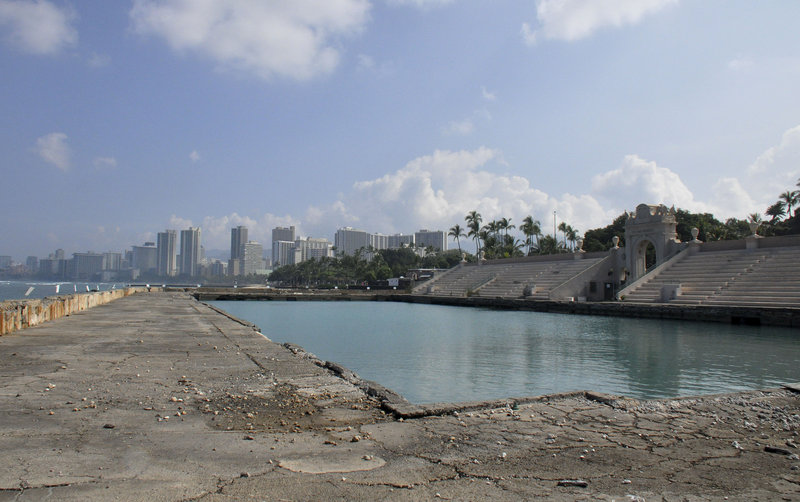HONOLULU – On the shoreline of Hawaii’s most famous beach, a decaying structure attracts little attention from wandering tourists.
A few glance curiously at the crumbling Waikiki Natatorium, a saltwater pool built in 1927 as a memorial to the 10,000 soldiers from Hawaii who served in World War I. But the monument’s walls are caked with salt and rust, and passers-by are quickly diverted by the lure of sand and waves.
The faded structure has been closed to the public for decades, the object of seemingly endless debate over whether it should be demolished or restored to its former glory. The latest plan is to replace it with a beach, more practical for the state’s lucrative tourism industry — and millions of dollars cheaper, according to state and local officials. They say a full restoration could cost nearly $70 million.
The corroding monument has challenged the community to address a delicate question: How do we honor those who have served when memorials deteriorate and finances are tight?
Similar debates have been playing out across the nation.
The National Trust for Historic Preservation waged a 2½-year fight to restore the aging Tomb of the Unknowns in Arlington National Cemetery in Washington, D.C., when some people proposed replacing it. Far less disagreement surrounded a decision to update the War Memorial Opera House in San Francisco after a powerful earthquake in 1989.
In Greensboro, N.C., residents have been grappling with what to do with the city’s own decaying tribute to the soldiers of World War I.
The Greensboro World War Memorial Stadium hosted minor league baseball for decades and even served as a location for notable sports films such as “Leatherheads” and “Bull Durham.”
Yet, despite continued use by kids and college-level athletes, the structure is falling into disrepair.
The historic pebbled facade is falling off, and some of the bleachers are blocked off because of crumbling concrete, said David Wharton, a Greensboro resident who is fighting as a member of his neighborhood association to restore the structure.
It’s been a losing battle. The city rejected two referendums to fund renovations and chose to build a new stadium for minor league baseball instead of fixing up the old one.
For many residents, the structure’s architectural and historic significance pales in comparison to more immediate needs.
“The war was a long time ago,” Wharton said. “I don’t think it’s meaningful for most people.”
Sometimes, communities decide that memorials aren’t worth the price.
In Michigan’s upper peninsula, the Wakefield Memorial Building once stood as a grand structure overlooking a lake in Wakefield, an old mining town. The memorial, built in 1924 to commemorate the sacrifices of World War I soldiers, was expansive, including a banquet hall, meeting room and theater.
By the 1950s, the community couldn’t afford the upkeep of the building and sold it to a private owner. Over the years, there were attempts to renovate the structure. But it was deemed too expensive and by 2010, the building was demolished.
John Siira, the city manager, said there are plans to build a new memorial at the site, along with a City Hall and library.
But the project is on hold, and Siira said he’s not sure when construction will start or when the project will pick up again.
In Honolulu, the fight over the beachside memorial is far from over.
Hawaii state and local officials recently announced a proposal to tear down the building and have started analyzing the plan — a process expected to take at least a year.
Honolulu Mayor Kirk Caldwell said a new beach would better serve local residents, and plans to preserve the memorial’s arch will honor the soldiers. Demolishing the structure for $18 million is much cheaper than the $69 million cost of full renovation, he said.
But an organization called Friends of the Natatorium says the city’s cost analysis is wrong and renovation would in fact be cheaper than demolition. The group, led by former state lawmaker Peter Apo, wants a moratorium on any plans to destroy the memorial to give the group time to raise funds for restoration.
“We’re a nation of short memory,” Apo said.
Send questions/comments to the editors.



Success. Please wait for the page to reload. If the page does not reload within 5 seconds, please refresh the page.
Enter your email and password to access comments.
Hi, to comment on stories you must . This profile is in addition to your subscription and website login.
Already have a commenting profile? .
Invalid username/password.
Please check your email to confirm and complete your registration.
Only subscribers are eligible to post comments. Please subscribe or login first for digital access. Here’s why.
Use the form below to reset your password. When you've submitted your account email, we will send an email with a reset code.